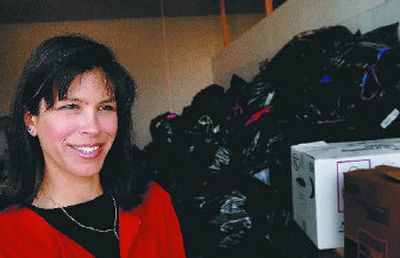Organization works to keep textiles out of landfill

The Red Cross saves lives. Community Green Cross saves landfill space.
Since its founding in 2005, the nonprofit organization has diverted more than 15 tons of used clothing, drapes and towels from the local landfill. It recently signed a three-year contract with Kootenai County to continue the recycling project.
Coeur d’Alene resident Karen Thurston got the idea for recycling textiles after she moved here three years ago.
“I noticed that some of the items I left out on the curb to be picked up for recycling weren’t being taken,” she said.
Out of curiosity, Thurston checked with Sam Ross, Kootenai County Solid Waste Department recycling coordinator. She learned there simply was no market for some of the items and that, because of her location, it cost more to transport them to a recycling center than to simply bury them in the landfill.
Ross also told Thurston the county was looking for a way to recycle things such as clothing, drapes and towels to save landfill space and extend the life of the dump.
So, Thurston did some research. She discovered that the large chain thrift stores have the option of having leftover clothing “baled” and exported. But the smaller thrift stores can’t afford the cost and have no other option than discarding the items in the landfill.
Thurston decided to do what she could to remedy the problem by founding Community Green Cross.
The organization started out small with just one large bin where the public could drop off clothing that still was usable but no longer wanted. Thurston collected the items and stored them in a rental shed.
Response steadily increased, leading to a one-year pilot agreement with the Solid Waste Department, which recently was extended for three years.
Now, two bins are located at the Ramsey transfer station, where about 600 pounds of textiles are collected each week. The items are taken to a warehouse in Sunset Mall, where Thurston and her husband operate the Cutting Edge, a sharpening service.
At the warehouse, the clothing is bagged, stacked and shipped to a broker. Much of the usable clothing is shipped overseas, mostly to Third World countries where there is a desperate need for inexpensive clothing.
Other textiles are made into products such as wiping rags, pet products, moving blankets and pads and craft supplies.
Thurston was amazed to learn that used clothing and other textiles are the eighth-largest export product from the United States. “Imported clothing is much more economical than new locally made clothing,” she said. “It also creates jobs in both the United States and Third World countries.”
For local donations, Thurston said, clothing must be clean and dry but does not have to be in perfect condition.
“We also accept bedding, shoes, belts, purses, backpacks and paperback books, and currently are paying 2 cents per pound ($40 per ton) for this material,” she said. “As the operation increases in volume, our goal is to increase what we can pay.”
For donations of more than 50 pounds (about two 30-gallon garbage bags), Thurston asks that deliveries be brought directly to the warehouse instead of being dropped off at a bin.
Besides being willing to recycle textiles, people can help in other ways. Community Green Cross is looking for more locations to place bins. Retail locations that are willing to “sponsor” a bin qualify for a tax-deductible donation of space for the bin. And any sponsors that are qualified educational, social or religious institutions get to keep the profits generated by their bins.
Another option is to help load a semitruck. If your nonprofit organization can produce six or more volunteers for an afternoon to load a delivery truck, Green Cross will make a donation of $500 to your organization.
“A local 4-H group, the Cougar Highlanders, did this recently,” Thurston said. “And they took half the money we gave them and donated it to Children’s Village. That was really nice.”